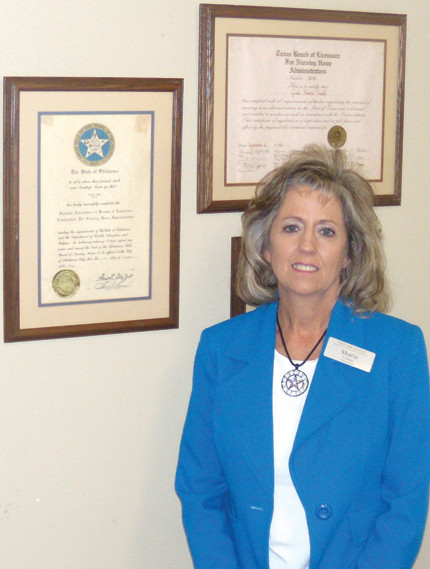New administrator talks about why she chose Gonzales and the future of nursing care
The Heights Rehabilitation and Long Term Care recently welcomed Sharie Folmar as its new Administrator. With a degree in Business Administration from Oklahoma State University and an impressive 27 years of health care experience, Folmar yields not only a strong educational background but also a passion for helping others through nursing care and rehabilitation. She has stepped into her new job with a high level of enthusiasm and compassion.
Folmar elaborated on her decision to choose The Heights as her new place of work. “There were two big reasons why I came here,” she said. “Touchstone, the company that purchased this nursing facility, has a wonderful approach and commitment to the people their providing care for. In addition, coming to see where they had a job opportunity and seeing this complex, I realized this would be a terrific environment to give all I can to those who need nursing care and rehabilitation.”
“We’ve been developing the concept of home-like environments in this industry for quite some time now, so now it has switched to pushing a culture change throughout the industry to where its not institutionalized, it’s more like home. We specialize in acknowledging the patient’s individual needs beyond just healthcare.”
“From a personalized perspective, let’s say a person doesn’t want to eat at eight o’clock,” Folmar said. “The old attitude in lots of nursing homes was if you weren’t there at a specified time to eat, then you just missed out. We’re focusing on a much more accommodating method of care, such as, if a patient was an early riser and wanted breakfast at five in the morning, then no problem! We’d be able to oblige.”
When asked what she thought about the general public’s opinions on nursing care and rehabilitation, Folmar offered an insightful perspective. “People still look at it as a place you go to finish out your life,” she explained. “Even though we have been in a rehabilitation mode for several years, I don’t think people get that concept yet.
“Here at The Heights of Gonzales, we provide a tremendous amount of care for those recovering from surgery or an accident so we can hopefully be able to send them back home to get on with their lives healthily and happily. In regards to those who cannot function on their own anymore, our perspective is that if this is their last stop in life, then we want to make sure they get to live the best quality life possible.”
Folmar’s career path toward nursing and rehabilitation is owed as much to serendipity as it is to her education. “I first got involved in nursing care when I responded to an ad in a newspaper looking for an office manager,” she said. “The ad didn’t say what type of business it was, so I just went to the address. When I pulled up, I realized it was a nursing home and went ‘uh oh!’ I sat in my car for a while and mulled it over, and came to the conclusion that I needed a job no matter what. So I went in and interviewed, and they liked my qualifications and welcomed me aboard.”
“What really got me hooked was once I got to know some of the patients there, I got to be friends with them. But since they were elderly, the realization set in that they wouldn’t be around forever, and it made me sad. So when the first resident I got attached to passed away, it was a bit difficult for me emotionally. But I soon realized that this was where I really belonged. I felt so fulfilled because I had such a positive impact on someone’s final moments in life.”
Folmar emphasized the fact that The Heights of Gonzales is as dedicated to rehabilitation for people of any age as it is to nursing care for the elderly. “As a society, we are always on the go, and people tend to become daredevils, putting themselves at risk for health problems such as strokes, which can affect people at any age. Consequently, we end up with a much more varied age population in long-term care facilities to where the culture change is necessary. Approaching an older group in a one-dimensional way isn’t working anymore because we’re helping people of all ages improve the quality of their lives.”
Folmar shed some additional light on her administrative background, in particular the different kinds of training she had to undertake in order to achieve her career goals. “When I moved to Texas, I got some more college credit hours under my belt, then took a state board exam. That was followed by a national board exam. By law, a nursing home has to have a licensed facility administrator in the facility; hence all the exams!”
As a licensed administrator, Folmar is responsible for overseeing the entire operation. “An administrator’s function is to work as a generalist,” she elaborated. “Obviously, there’s no way you can know everything. When it comes to patient care, as an administrator you don’t have to be a licensed nurse. Our job is essentially learning how to hire quality individuals to oversee the specialty areas.”
Folmar also expressed a personal affection for her patients, an attribute not often seen in bigger establishments. “Since this is more like their home, we get to have a lot more contact and interaction,” she said. “Long-term patients tend to become like my family after a while.”
As for the future and progressive direction of nursing and rehabilitation, Folmar offered an optimistic outlook. “What we’d like to communicate to the citizens of Gonzales is that we are here to serve the community,” she noted. “If you have healthcare needs, then our goal is to be able to meet them.”
Comments







